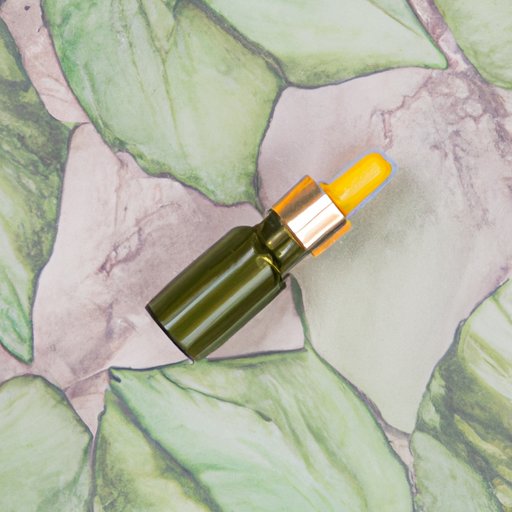
Introduction
Vitamin E oil is a popular ingredient in many skincare products due to its numerous benefits. It has been touted for its ability to moisturize the skin, fight free radicals, and reduce the appearance of fine lines and wrinkles. But can you use vitamin E oil directly on your face? In this article, we’ll explore the benefits of using vitamin E oil on your face, how it compares to other facial oils, the potential side effects, and tips for safely using it.
Exploring the Benefits of Using Vitamin E Oil on Your Face
Vitamin E oil is rich in antioxidants, which help protect the skin from harmful free radicals that can cause damage and accelerate aging. It also has anti-inflammatory properties that can help soothe irritated skin. Vitamin E oil is a natural moisturizer that can help keep the skin hydrated and soft. To use vitamin E oil on your face, simply apply a few drops to your skin and massage gently. You can also mix it with your favorite moisturizer or use it as a spot treatment for dry patches.
The Difference Between Using Vitamin E Oil and Other Facial Oils
While vitamin E oil has numerous benefits for the skin, it’s important to note that there are many other facial oils available that can also be beneficial. Some popular facial oils include argan oil, jojoba oil, and rosehip oil. Each of these oils has its unique properties, and the best option depends on your skin type and needs. For instance, jojoba oil is great for oily skin and helps regulate sebum production while argan oil is best for dry skin. When selecting a facial oil, look for one that is cold-pressed and organic for the best quality.
The Potential Side Effects of Using Vitamin E Oil on Your Face
While vitamin E oil is generally safe for most skin types, some individuals may experience side effects. Those with acne-prone skin may find that vitamin E oil exacerbates their condition, and it may cause clogged pores and breakouts. Additionally, those with sensitive skin may experience redness, itching, or irritation. To reduce the risk of these side effects, do a patch test before applying it to your face and use it sparingly. If you experience any adverse reactions, discontinue use immediately and consult with a dermatologist.
Can You Use Vitamin E Oil for Acne-Prone Skin?
Individuals with acne-prone skin may wonder if vitamin E oil can help reduce breakouts. While it has not been shown to prevent acne, it can help reduce inflammation and scarring associated with acne. To use vitamin E oil on acne-prone skin, dilute it with a carrier oil such as jojoba oil or coconut oil, and apply a small amount to the affected area. Be sure to avoid applying it to any active breakouts.
How to Make a Homemade Vitamin E Oil Facial Mask
If you’re interested in a DIY approach to skincare, try making a vitamin E oil facial mask at home. To make this mask, you’ll need 1-2 tablespoons of vitamin E oil, 2 tablespoons of honey, and 1 mashed avocado. Mix the ingredients together in a bowl until they form a smooth paste. Apply the paste to your face and leave it on for 15-20 minutes. Rinse with warm water and pat your skin dry.
Tips for Choosing the Best Quality Vitamin E Oil for Your Skin
When selecting a vitamin E oil for your skin, look for one that is 100% pure and free of any additives or fillers. Cold-pressed and organic oils are the best quality as they retain the highest amount of antioxidants and nutrients. Check the label to ensure that the oil is not synthetic or derived from genetically modified sources. Some recommended brands for different budgets include Trader Joe’s Vitamin E Oil, Jason Vitamin E Oil, and The Body Shop Vitamin E Oil.
Conclusion
Vitamin E oil is a natural and effective ingredient that can benefit your skin in numerous ways. Whether you’re using it to moisturize, fight free radicals, or reduce the appearance of fine lines, it’s important to choose a high-quality oil and use it safely. Be sure to do a patch test and be mindful of potential side effects. With these tips in mind, you can enjoy the many benefits of vitamin E oil on your face.





